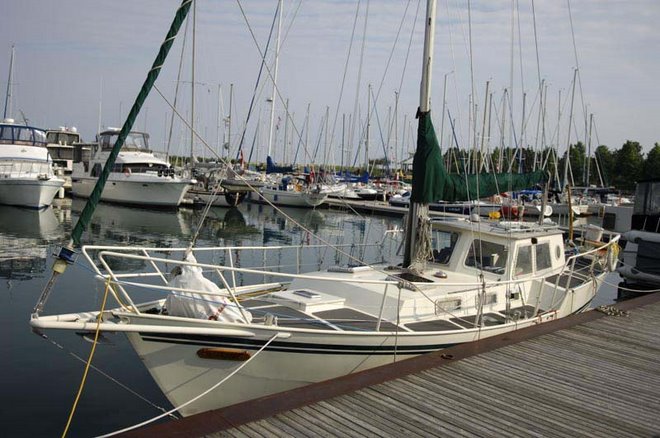 |
| Not quite the North West Passage, but our club's basin would be completely frozen over were it not for the "bubbler"-type activities of clustered ducks. |
Nature is no respecter of my refit schedule, it appears. It's been an appallingly cold winter (yes, even by Canadian standards), and opportunities to continue with boat fixing have been distressingly few. I went down to
Alchemy yesterday by bicycle (the roads being dry and me having longjohns) to get a couple of hours of battery charging in. I was concerned that at several weeks between charges (the only draw is the LED of the pump switch, in case...ha!...I had a lot of wind-driven
rainwater come in), the single Group 24 start battery I have aboard
might undergo a phase transition to fully
solid. This has been the case with some bottles of pop on my enclosed porch: even the leaky Victorian brickwork has been insufficient to keep outside temperatures of -25C at bay.
A quick inspection showed the battery unburst and, of more import, no signs of the
antifreeze with which I winterize the engine bursting out from, say, the seams of the diesel. The lowest temperature having been -25C, and most of the "pink stuff" RV-type plumbing grade antifreeze being rated for -50F/-46C, why should I have worried about that?
 |
| More than I need for even two boats, but if it's on sale, I have been known to buy two years' supply. The difference is applied to the rum budget in order to avoid budget rum. |
Well, it happens that I have heard a rumour that the -50F pink plumbing antifreeze sold by the local-to-me West Marine (before
it went, as predicted last November, belly-up in January) was, in fact, freezing at -20C. A diesel mechanic reported this to my usually reliable source. Now, I may have used this stuff on either, or both boats: I tend to have half-bottles here and there left over. I don't dilute the stuff: the engine cooling circuits on
Valiente (raw-water or "open") and
Alchemy (closed with heat exchanger) get full strength, and the "block" cooling circuit in
Alchemy is full of undiluted Prestone DEX (good to -84F, which is a brisk day on Mars). So I'm not
super worried, but it is indicative of a bad quality control issue if it's true that could, potentially, seriously damage a lot of boats. Most owners do not regularly visit their boats in the dead of winter; I was certainly alone in the boat yard yesterday, and burst blocks or split hoses are not what one would wish to learn about when, on a fresh day in April, it's time to pull the plastic off. In addition, some older and/or wealthier and/or mechanically disinclined boat owners have the process of "
winterization" contracted out to services or diesel mechanics, which is not only too rich for my blood, but is not the sort of job I would tend to farm out, having heard of horror stories and half-assery in the past.
 |
| Guess what can break a push-broom? This snow can break a push-broom. |
I have yet to haul my Honda genset down to
Valiente. We'll see if there's an issue when I do.
It's important to make time and do correct prep in the boating game.









